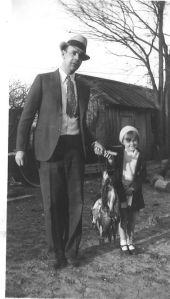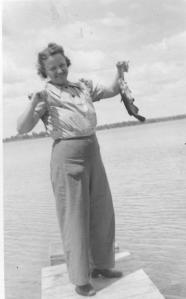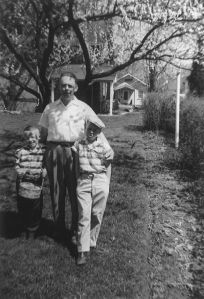My Grandpa Hessey was and still is my fishing hero. I have so many images of Grandpa which bring smiles to my face. Almost always, those images have to do with Grandpa and me in the outdoors. The photo below was taken in March of 1949, just one month before I was born. I wonder whether Grandpa knew his soon to be born Grandson would be a lifelong fishing buddy.
Grandpa worked for the United States Postal Service. His shift as a mail sorter began at 3 AM returning home at noon. Depending on the weather and time of year, he spent his off work time fishing, hunting or gardening. His interests complimented each other. He was quite a successful fisherman in his own right. He loved fishing for catfish. Apparently, some of his catches were worthy of publicity in the local paper.
Grandpa was an organic gardener. His compost pile was the envy of everyone on Cory Street in Fostoria, Ohio. His fertile garden and lush lawn provided a perfect home for fat juicy night crawlers. As dew began to settle on the grass, he would grab two flashlights, hand me one, and into the backyard we would go. Slowly we eased our way through the lawn and along the flower gardens all the while moving the faint edge of the light cast by the flashlight slowly forward. The goal was to catch a glimpse of a night crawler on top of the ground. If you were really lucky, you could see two night crawlers intertwined. I of course had no idea what that was about. Once you memorized their location on the ground we would move the beam of light away and grab the slimy crawlers.
Fostoria is located in Seneca, Hancock, and Wood counties which intersect at the top of County Line Road one block from where my mother, Beverly grew up watching her father explore the outdoors. My Mother was also exposed to fishing at an early age. Apparently, Grandpa and Mom could not wait to get out of their Sunday church clothes before showing off a great catch of crappies.
The geology his home area was a boon to catching our own bait. Grandpa took as much pleasure in catching bait as he did catching fish with the bait. Agricultural ground in that part of Ohio is underlain by a seam of blue clay which is nearly impenetrable by water. In order to drain crop land, farmers of the area excavated ditches around the perimeter of their fields. Drain tile was installed two to three feet below the surface to carry rainwater from the fields to the ditches. As a result, the ditches would fill with water. Many of these water filled ditches were home to minnows, hard craws, and an occasional bonus of a bona fide bass catching soft craw.
My Grandpa made us narrow mesh seines which looked like two pieces of cheesecloth strung between bamboo handles approximately 3 feet long. The bottom edge of seine mesh was strung with lead stick sinkers. With the seine bumping the bottom of the “cricks”, we would slowly move upstream. For a little kid who was active enough for his Grandpa to call him a “wiggle worm”, bait catching was as much fun and sometimes a whole lot more active than fishing.
I can still sense the excited anticipation as my skinny arms lifted the seine from the water. I would peer over the edge of the net eager to discover what wriggling creatures would attempt to escape into the stream. When we were sufficiently armed with bait, we went fishing. Often, catching bait made a guy thirsty necessitating a stop at Stewart’s root beer stand where we would pull the car up to the old fashioned drive in. The cute waitresses would roller skate to your car, take an order for root beer in frosted mugs and return with a tall glass filled with the sweet tasting icy cold soda destined to wet our lips.
I learned a very important Grandpa Hessey lesson on those bait catching adventures. He would always say “Stevie, remember, you can never have too much bait!” To this day, I know that two dozen soft craws are better than one and three boxes of wax worms are better than two.
In early spring, Grandpa had a favorite quarry which he just knew was full of hungry pre-spawn white crappies. The quarry was nestled up against some railroad tracks. Often trains would go by. In early spring, I would amuse myself by watching the trains when there was no action. These were the same trains which you could hear from my bedroom in his home late in the evening. The conductors blew lonely whistles indicating the progress of freight across the street track intersections of the small Ohio town. I loved that haunting whistle because when it blew, I knew the next morning I would wake up and go fishing with Grandpa.
On one trip to the railroad quarry, Grandpa hoisted me up onto a stump some 4 to 5 feet off the ground. He handed me my 10 foot bamboo cane pole rigged with black linen line and a round red and white bopper. After baiting the hook with a “minnie”, I swung the bait into the water and watched impatiently for any quivering of the bobber indicating a bite. “I think you’re getting a nibble”, he would say often in an effort to keep me on my toes. My attention span was okay but not indefinite. On this particular day, the crappies were sleeping. I put the cane pole under one leg and began to pick bare vines from the side of the stump. I found that if I tugged just right, the entire bare vine could be stripped from the top of the stump to the ground. Being bored, I removed most of the vines from the fat stump and was quite proud of my efforts. I woke up the next morning an itchy mess with poison oak on every inch (yes, I mean every inch) of my body. Grandma chastised Grandpa, “Dick, what in the world did you do to this boy?” He shrugged as if to say this one will only learn the hard way. He was right.
On the southeast side of Fostoria, a series of quarries were dug as sources of water for the community. Well-stocked, we often fished these quarries in early spring. I remember days when the bopper continuously went under and I would yank my long cane pole with a well hooked crappie attched up over my head and behind me on the bank. I would laugh and scream, “I got one!”. Grandpa would smile.
In the fall, Grandpa would wander through the woods in the country. He must have known every farmer in the area because we never ran out of woods in which to look for squirrels, harvested fields where we could hunt rabbits and pheasants, orchards in which we could seek morel mushrooms and plots of walnut trees which yielded the strong tasting black walnuts Grandma used in Holiday desserts. Grandpa always asked permission to use others land even if he had been there before. I remember many a neighborly conversation about the weather, crops, and the Cleveland Indians. When we left a farm, we would always return to the farm house or barn and offer part of what we were taking home.
For the most part, Grandma tolerated the fishing. In fact, occasionally she fished with Grandpa.
She did put her foot down on one occasion when Grandpa decided he could pickle a 15 pound carp he had caught. My Grandparents home was originally heated by coal. The furnace had its own storage room. Black chunks the size of soft balls were dumped by chute through a window which could be opened to accept delivery into the basement coal bin. At some point, a conversion to gas occurred permitting my Grandpa to put the bin to use as a storage room to dry out the black walnuts he collected. Also located in the former coal room was a chest freezer in which my Grandmother stored fish, game and other food. Unfortunately, there was no light in the coal bin. The only source of light was from the adjoining room of the basement and the bare bulb cast illumination only a few feet into the bin. Grandpa had placed a large roasting pan filled with carp and saltwater on the un-illuminated end of the chest freezer. Not yet knowing about the carp, Grandma went down to get some food and opened the freezer lid. Splash! The slimy wet cold ugly fish glanced off her house dress and slid down her legs coming to rest on her feet. Thereafter, Grandpa did not brine fish in the basement.
Despite the carping she took, one Christmas Grandma gave her husband a canvas on metal frame ice shanty. I remember the ice shanty had been assembled, apparently by Santa Claus, as it was standing next to the Christmas tree when my brother John and I rushed down one very early Christmas morning to see what Santa had delivered. Grandma felt the shanty was needed because the previous year an ice fishing mishap had occurred. Grandpa had taken me ice fishing near State Dock located on Catawba Island which juts into Lake Erie. It was a late winter day. The sun was shining raising the temperature into the 40s. Grandpa had built a tackle box with two sled runners on the bottom to ease transporting his fishing gear across the frozen lake. He pulled the box across clear ice which reflected a deep blue sky while carrying an ice spud to be used to cut our fishing hole. When we were about 200 yards from shore, he stepped on a partially frozen hole and one leg was suddenly soaked to above the knee. He hoisted the dripping leg from the freezing water, shook it off, and looked at me. “What are we going to do now, Grandpa?” He took a brief chew on his unlit King Edward cigar and said “We’re going fishing. That’s what we came here to do.”
We fished the rest of the day. As the afternoon sun set and the temperature dropped, his pant leg froze. As I have pondered that extraordinary Christmas gift, I have come to understand that Grandma bought the shanty to keep Grandpa safe. I do not think she really grasped just how far out on Lake Erie he would walk to reach a spot where he sensed there were hungry yellow perch waiting below the frozen surface.
Grandpa also taught me that it is impossible to keep accurate time while fishing. One summer Sunday morning, we arose early to fish at the nearby stone quarry. We had some beautiful soft craws left over from the day before and it was essential they be offered to hungry bass before church. My Grandparents attended the Methodist Church where my parents were married. As my Father was a Methodist minister, church attendance was mandatory for me even when my parents were not around. So on this particular morning, we got an early start knowing Grandma would be waiting in her Sunday dress and hat ready to worship.
We fished off a bluff about 9 feet above the surface. The limestone wall was sheer and you could easily look down into the submerged trees which had fallen into the edge of the water. The plan was to hook soft craws through the tail and gently drop them down among the snags of the underwater tree limbs. Grandpa always taught me something new about fishing each time we went. Today, I was to put the soft craw on the hook. I was a little nervous. Having seined for soft craws previously, I was fully aware of the feisty critters pinchers. At Grandpa’s urging, I stuck my hand into the dark hole of the bait bucket and came up with a craw. I held it in one hand and as I moved the hook towards the tail, the agitated bait pinched my finger. I dropped the soft craw, it bounced once on the rock ledge and fell gently into the crystal clear water. As soon as it plopped near the submerged trees, the biggest bass I had ever seen gently eased itself off the bottom, opened its mouth and inhaled the free swimming bait as it scurried tail first towards the bottom.
Grandpa said, “Stevie, it works a lot better if the hook is in the craw.” The gentle reprimand was delivered with a smile in his voice. He then glanced down at his watch and I for the first but not the last time realized the impossibility of keeping accurate time while fishing. By the time we arrived home, the collection plate was no doubt heading around the church after the preacher had delivered his sermon. To make matters worse, Grandma had not gone to church because she was waiting to go with her husband and grandson. As we stepped into her tiny kitchen, she gently shook her head and said, “Well, if we had to miss church, I hope you caught something”.
Wandering through these memories brings to mind a permanent image of Grandpa which vividly connects us. I can still see him exiting his blue and white 1957 Chevrolet and walking up the path towards the back porch of his home. Between the driveway and the back porch was the largest sweet cherry tree in Fostoria. Below is a photo of my brother John and I with Grandpa as the cherry tree blossoms in the background.
No five people could pick the cherries the tree produced each June. The lowest branches were the same distance off the ground as Grandpa’s head. As he took large long strides with his King Edward cigar trailing smoke from his hand, I remember Grandpa would slide his head and shoulders to the left to pass safely under the lowest branch. As he ducked, he would glance at me with a smile.
The sweet cherry tree held symbols of the fishing customs of the 1950s. Grandpa was not a catch and release man. Every caught fish was cleaned to provide food for his family and neighbors. If the fish was an egg laden female, the eggs were fried and served at dinner. I really hated those! Grandpa respected the fish he caught in a way which scared me at the time. If he caught a really big fish, he would cut off the head and nail it to the trunk of that big old cherry tree. It seemed very gruesome to a young child. In fact, it still does. Reflection has helped me accept those rude fish mounts as Grandpa’s way of telling his fish stories. And so as I fondly remember my Grandpa ducking under the cherry tree and tell fishing tales of my own, I remember his smile and the stories those fish told. Grandpa you are missed and loved greatly by your fishing Grandson.





